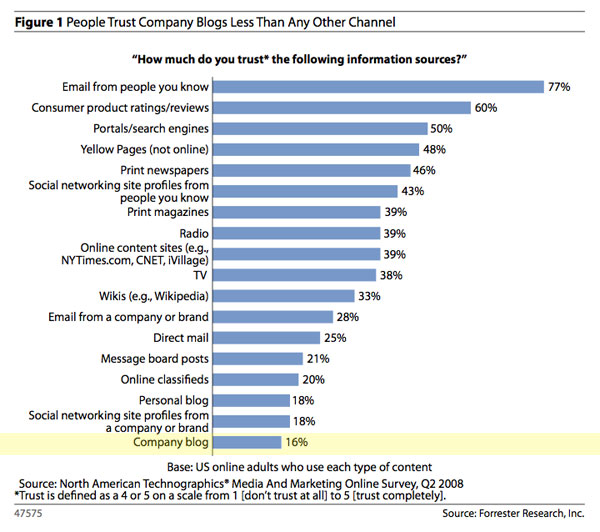 A new report from Forrester Research analyst Josh Bernoff found that just 16% of US online adults think that corporate blogs are a trusted source of information. Though regular blog readers trust corporate blogs a bit more than the general online populace, Forrester found that company blogs are the least trusted source of product and service information on the web.
A new report from Forrester Research analyst Josh Bernoff found that just 16% of US online adults think that corporate blogs are a trusted source of information. Though regular blog readers trust corporate blogs a bit more than the general online populace, Forrester found that company blogs are the least trusted source of product and service information on the web.
Bernoff notes that many consumers think that corporate blogs are an extension of a company’s web site, and thus are just another outlet for the company’s marketing goals. That’s not really surprising given that an earlier Forrester study of Fortune 500 blogs founds that the vast majority were in fact extensions of the company’s marketing efforts.
In that study, Forrester found that 56% just republish press releases or already public news, while 70% stick to strictly business topics related to their core product line. It is no wonder that 2/3rds of corporate blogs get no comments.
A blog can be a successful and useful part of the web strategy for your company. In July, we made corporate blogging our number one tip for how to speak directly to your customers — which is something you should be striving to do. We counseled that you shouldn’t just write about your company or your products. “Instead, offer insight into your industry, your methods, and your thoughts,” we wrote. We cited the blog of web business software company 37signals, Signal vs. Noise, as a great example of a winning corporate blog.
“Signal vs. Noise is successful because the employees at 37signals, who all contribute to the blog, don’t just write about the company’s products, but rather writer about design and development practices in general. They give business advice, links to things they enjoy, tips on how to manage time, and insight into their personal and professional lives. By doing so, 37signals has been able to foster a connection with their community and turn customers into die-hard fans who evangelize their products for them.”
37signals also made our list of 15 companies that really get corporate blogging along with 14 others whose blogs you should really check out for inspiration about how to do corporate blogging the right way.
Bernoff offers similar advice in his report about how to jazz up your company blog and position yourself for success. He offers a list of seven tips to help create a winning corporate blog and avoid the “trust trap.”
- Blog about the customer’s problem. – A blog is a great place to respond to issues that are concerning your customers.
- Blog to your hordes of fans. – Bernoff says this won’t work for many companies, only those that already have hordes of fans. But we’re less sure. Certainly for a company in a boring business (like making mufflers — Bernoff’s example), it will be a lot harder, but blogging is a great way to expand your fan base and turn fans into fanatics.
- Blog about issues at the core of a community. – Creating a community around your blog that allows your customers to connect is a great idea.
- Blog because you’re a celebrity. – Jeff Bezos, Mark Cuban, Donald Trump — if you have name recognition you should already be blogging.
- For B2B companies, get your employees in on the act. – Everyone at 37signals contributes to their company blog, and for many companies, blogging is part of the corporate culture. Microsoft, Sun, Adobe, and others have provided a platform for their employees to blog with great success.
- In media, use blogs to expand the content and audience. – Bernoff suggests that for media companies, blogging can expand the reach. This has definitely been true for papers like the New York Times, which now runs a pair of the most popular blogs on the net in Bits (tech) and the Caucus (politics). On the flip side, for non-media companies, blogging can be a way to control the news cycle and bypass the media by speaking directly to customers.
- Blog to have a voice. – Bernoff calls this the “weakest rationale,” but we actually think it might be the most important point. Corporate blogs need to have a voice. Conversational blogs that that talk with customers instead of at them will be much more successful in the long run.
The Forrester report about trust and corporate blogging is available for free.

 Josh Catone
Josh CatoneBefore joining Jilt, Josh Catone was the Executive Director of Editorial Projects at Mashable, the Lead Writer at ReadWriteWeb, Lead Blogger at SitePoint, and the Community Evangelist at DandyID. On the side, Josh enjoys managing his blog The Fluffington Post.


